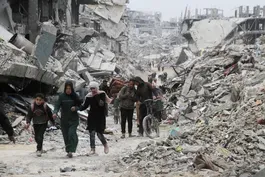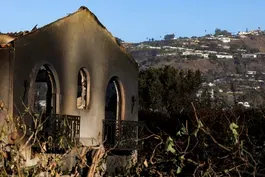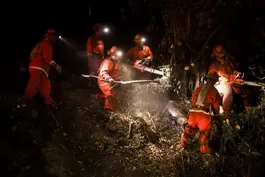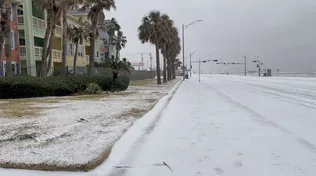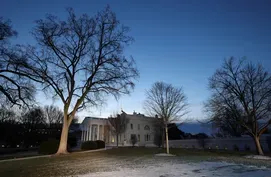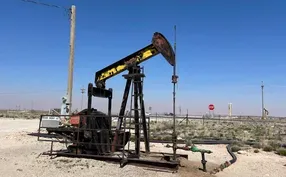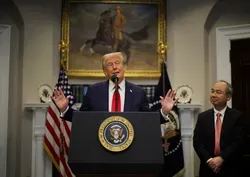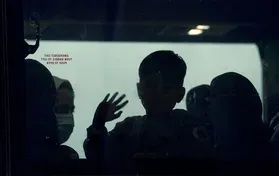
Pentagon to send troops to border for Trump's crackdown
Clip: 1/22/2025 | 6m 7sVideo has Closed Captions
Pentagon will send troops to southern border to carry out Trump's immigration crackdown
For perspective on President Trump’s order sending 1,500 active-duty troops to the Mexican border, Amna Nawaz spoke with retired Rear Admiral James McPherson. He served as undersecretary of the Army and as the Army's general counsel during the first Trump administration.
Major corporate funding for the PBS News Hour is provided by BDO, BNSF, Consumer Cellular, American Cruise Lines, and Raymond James. Funding for the PBS NewsHour Weekend is provided by...

Pentagon to send troops to border for Trump's crackdown
Clip: 1/22/2025 | 6m 7sVideo has Closed Captions
For perspective on President Trump’s order sending 1,500 active-duty troops to the Mexican border, Amna Nawaz spoke with retired Rear Admiral James McPherson. He served as undersecretary of the Army and as the Army's general counsel during the first Trump administration.
How to Watch PBS News Hour
PBS News Hour is available to stream on pbs.org and the free PBS App, available on iPhone, Apple TV, Android TV, Android smartphones, Amazon Fire TV, Amazon Fire Tablet, Roku, Samsung Smart TV, and Vizio.
Providing Support for PBS.org
Learn Moreabout PBS online sponsorshipAMNA NAWAZ: Besides an order sending 1,500 active-duty troops to the Mexican border, late today, the Defense Department announced it had been tasked with supporting the Department of Homeland Security's deportation flights and assisting in the construction of temporary and permanent physical barriers along the border.
For a perspective on all of this, we turn now to retired Rear Admiral James McPherson.
He served as undersecretary of the Army and as the Army's general counsel during the first Trump administration.
He also had a 25-year career in the Navy, serving as its top lawyer in uniform.
Admiral, welcome back to the "News Hour."
So, the plans, as has been laid out so far, for the active-duty troops at the southern border and in support of these deportation flights, do you view that as an appropriate use of the military?
REAR ADM. JAMES MCPHERSON (RET.
), Former U.S.
Undersecretary of the Army: Well, thanks, Amna.
It's not unusual.
We have had the military on the border since the 1990s.
They have always been in a support role, that is, supporting Customs and Border Protection or the Border Patrol, through transportation, through medical support, through communications, through surveillance.
They have never been involved directly in law enforcement, that is, enforcing immigration laws by apprehending, arresting, interrogating individuals that are captured attempting to come across the border.
It's my understanding that this current deployment will keep with that current -- that previous mission.
In other words, these troops will be in support of Customs and Border Protection.
They will not be engaged in law enforcement.
Now, that may change dramatically in the days to come based upon the executive orders that the president signed Monday afternoon.
AMNA NAWAZ: And based on that executive order, I know there are a lot of questions, because senior military officials did go on to say they anticipate many additional missions ahead.
What could those entail?
Could U.S. military troops be asked to arrest migrants at the border to try to stop them from crossing?
And would that be appropriate?
REAR ADM. JAMES MCPHERSON (RET).
: Well, to try to stop them from crossing, the answer is yes.
Those two orders, the first one declared a national emergency at the southern border.
That's not unusual either.
The president did that in 2019 during Trump one, and as a result of that could transfer funds to border -- what we know as the border wall.
But this national emergency has wording that wasn't included in that first one in 2019 that attempts to preclude the legal challenges that were brought against that transfer of funds.
More importantly was the second executive order he signed, which directed Northern Command, that is, the geographical combatant commander for North America, Mexico, United States, Canada, to change what's called their unified command plan.
That's a plan that sets forth the mission, the responsibilities of what a combatant commander does.
And they were specifically directed to change their unified command plan to now include sealing the border, maintaining the sovereignty of the United States, and repelling invasion.
If that in fact is done and active-duty troops are sent to the border, they will be sent to the border not to enforce immigration laws, but to repel an invasion, which is very different.
They won't be involved in a law enforcement role, but a military role of, again, repelling that... AMNA NAWAZ: Admiral, if I may, you're using this word invasion, which we have heard the present use repeatedly.
I should point out that border numbers have actually been coming down dramatically over the last several months, though they did reach record highs in the previous administration.
Do you view what's happening at the southern border as an invasion?
REAR ADM. JAMES MCPHERSON (RET).
: The facts simply don't support that, Amna.
As we heard from the border czar, even in the past few days, the numbers have dropped dramatically.
And they have dropped dramatically what they were even in the Trump one administration.
So I don't think that this -- that it changed the unified plan of including now repelling an invasion has any factual basis.
AMNA NAWAZ: So we have -- we should point out, U.S. forces overseas, for example, in Iraq and Afghanistan were asked to provide security for cities and villages.
Why can't U.S. military forces do similar kind of missions along the U.S. border?
REAR ADM. JAMES MCPHERSON (RET).
: Because when they were in Iraq and Afghanistan, they were opposing an armed force.
They were engaged in armed encounters.
They were engaged in traditionally the mission of our military, and that is to fight our armed -- fight our wars.
We don't have a war going on at the southern border.
We have a law enforcement crisis perhaps.
But that's not an invasion.
AMNA NAWAZ: One of the things my colleague Nick Schifrin reported today was, this deployment increases the number of troops at the border by 60 percent to some 4,000.
One senior official said the number could go as high as 10,000.
What's your reaction to that?
REAR ADM. JAMES MCPHERSON (RET).
: Again there are some -- the current deployment is in support of border protection.
I would say that border protection may use them in extended manner.
But under the current orders under the current law, they can only be used in that support role.
They can't be used to enforce immigration law.
AMNA NAWAZ: But 10,000 U.S. troops at the border, what does that say to you about the use of active-duty military troops?
REAR ADM. JAMES MCPHERSON (RET).
: Well, it says that they're being ill-used, if you will, that it's detracting from their mission to protect our country, is detracting from their operational tempo, and is detracting from their readiness.
I think it does a disservice to our military to send them to the border to try and engage in apprehending illegal aliens, if you will.
AMNA NAWAZ: Finally, Admiral, we know that the president has directed the incoming secretary of defense and incoming homeland security chief to report back within 90 days if they think that the Insurrection Act should be invoked.
That's an 1807 law that would allow U.S. troops to be used in civilian law enforcement on U.S. soil.
What's your reaction to that?
REAR ADM. JAMES MCPHERSON (RET).
: That's a dangerous route we should not be taking.
These current executable orders only speak to the southern border.
They don't speak to using the military in the interior of the United States.
The Insurrection Act would give the president the authority to do just that, to use our armed forces in Chicago, in Detroit, in Atlanta.
I think that's dangerous.
AMNA NAWAZ: That is retired Rear Admiral James McPherson joining us tonight.
Admiral McPherson, thank you for your time.
We appreciate it.
REAR ADM. JAMES MCPHERSON (RET).
: Thank you.
A Brief But Spectacular take on art bringing people together
Video has Closed Captions
A Brief But Spectacular take on the art of bringing people together (3m 15s)
Gazans begin clearing rubble as tenuous ceasefire holds
Video has Closed Captions
Gazans return to homes in ruins and begin clearing rubble as tenuous ceasefire holds (5m 20s)
Honoring the lives lost in the Los Angeles wildfires
Video has Closed Captions
Honoring the lives lost in the Los Angeles wildfires (3m 6s)
Incarcerated firefighters help battle the blazes around LA
Video has Closed Captions
How incarcerated firefighters are helping battle the blazes around Los Angeles (6m 30s)
News Wrap: Storm brings record-breaking snow to Gulf Coast
Video has Closed Captions
News Wrap: Massive winter storm brings record-breaking snow to Gulf Coast (5m 28s)
Trump administration ends government diversity programs
Video has Closed Captions
Trump administration ends government diversity programs and takes aim at DEI nationwide (4m 34s)
Trump begins push for more oil and gas production
Video has Closed Captions
Trump pushes for more oil and gas production and a roll-back of climate initiatives (7m 12s)
Trump issues more orders targeting immigration and DEI
Video has Closed Captions
Trump issues more executive orders targeting immigration and DEI (3m 25s)
Trump order cancels flights for refugees to settle in U.S.
Video has Closed Captions
Refugees already cleared to settle in U.S. have flights canceled after Trump order (6m 8s)
Providing Support for PBS.org
Learn Moreabout PBS online sponsorshipMajor corporate funding for the PBS News Hour is provided by BDO, BNSF, Consumer Cellular, American Cruise Lines, and Raymond James. Funding for the PBS NewsHour Weekend is provided by...


